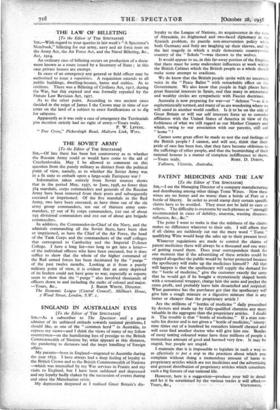THE SOVIET ARMY [To the Editor of THE SPECTATOR] SIR,—Of
late there has been hot controversy as to whether the Russian Army could or would have come to the aid of Czechoslovakia. May I be allowed to comment on this question from the purely military as distinct from the political point of view, namely, as to whether the Soviet Army was in a fit state to embark upon a large-scale European war ?
Information taken entirely from Soviet sources shows that in the period May, 1937, to June, 1938, no fewer than 384 marshals, corps commanders and generals of the Russian Army have been removed from their posts and subsequently executed or imprisoned. Of the five marshals in the Red Army, two have been executed, as have three out of the six army group commanders, ten out of thirteen army com- manders, 57 out of 85 corps commanders, no out of about 193 divisional commanders and 202 out of about 400 brigade commanders.
In addition, the Commander-in-Chief of the Navy, and the admirals commanding all the Soviet fleets, have been shot or imprisoned, as have the Chief of the Air Force, the head of the Tank Corps and the commandants of the staff colleges that correspond to Camberley and the Imperial D.2fence College. I have a long list—too long to get into a letter— of the individual officers who have been executed, but it does suffice to show that the whole of the higher command of the Red armed forces has been decimated by the " purge " of the past twelve months. Looking at it from a purely military point of view, it is evident that an army deprived of its leaders could not have gone to war, especially as reports seem to show that the " purge " also involved thousands of officers down to and including the ranks of colonel and major.
—Yours, &c., J. BAKER WHITE, Director. The Economic League (Central Council), Mulban House, 2 Wood Street, London, S.W. r.
























































 Previous page
Previous page